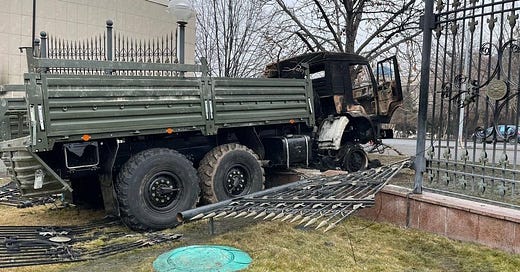Eurasia Note #14 - Foreigners Meddle, Kazakhs Complicit?
Reports that insurgents came from abroad; internal security forces stood down
Gunfire continues in Almaty’s Republic Square
4,266 arrests. including fighters based in Kyrgyzstan, Uzbekistan and Dubai
Six waves of terrorist attacks in Almaty, ‘up to 20,000 bandits’
Ex-minister Ertysbayev alleges complicity by KNB National Security Cttee
Order restored to regions by Friday morning
Tbilisi, Jan 8, 2022
The Kazakhstan attacks were the act of outside intervention — but with signs of internal complicity. Many of those arrested are reported to be foreigners, some of them were holed up in villages around Almaty, some speaking foreign dialects, with accounts of at least one beheading according to reports collated on Telegram.
The country shares a 1,700 kilometer border with western China and the heavily-muslim Xinjiang province, home to the Turkic Uyghur people. Some insurgents, however, are reported to come from as far away as Dubai and trained in the Kazakh mountains.
Russian Ambassador to the U.S. Anatoly Antonov told Newsweek the attacks were “externally provoked” and blamed Western destabilization of the Middle East and Afghanistan for the spread of religious extremism.
The U.S. State Department asserted on Thursday that the unrest was “fundamentally economic and political in nature" — which now looks ill-informed or misleading.
A split in the Kazakh government, police and security apparatus has for now sidelined former president Nursultan Nazarbayev. This seems to explain why army and police initially withdrew from the streets of the biggest city and former capital Almaty — though not necessarily in co-ordination with the insurgents.
The timing of the insurgency suggests the protagonists were well informed and connected. Like Ukraine, it’s partly about oil and companies like Chevron are deeply embedded. Kazakstan’s giant Tengiz oil field would make a wealthy country on its own. The protests began among oil workers and concerned energy prices.
Energy companies and banks have their own intelligence services and it’s hard to imagine they were caught completely by surprise. Kazakhstan has some of the world’s richest natural resources. Those who seek to control them are well represented in the Central Asian heartland, with 700 U.S. companies, middlemen like Tony Blair, and some of the wealthiest families who are deeply invested in natural resources.
It is only a small Steppe and a jump in history to recall that the Georgian Josef Jughashvili, later known as Stalin, worked in the Black Sea oil port of Batumi for the Rothschilds.
As Simon Sebag Montefiore retells, on his first day of work in Dec 1901, the Rothschild refinery caught fire. Stalin then organized a strike and ordered the assassination of the refinery director. In 1907 Stalin found himself in the Caspian oil city of Baku, where despite the intelligence service of the Tsar and the Rothschilds, he organized another strike — which the company paid him to stop. The family later helped finance Stalin. Bankers and oilers work in mysterious ways. [1]
Back to the future
The narrative created for public consumption is that the U.S. caved in Afghanistan giving the Chinese Communist Party free rein — and responsibility for events — in the region. The state-corporatist media in the West is filled with headlines about boycotts of the Chinese winter Olympic Games, while NATO bangs the drum about Russian troops across the border from Ukraine.
The real story is a little different. (Article approx 1,000 words, 6 minute read).
Keep reading with a 7-day free trial
Subscribe to Moneycircus to keep reading this post and get 7 days of free access to the full post archives.



